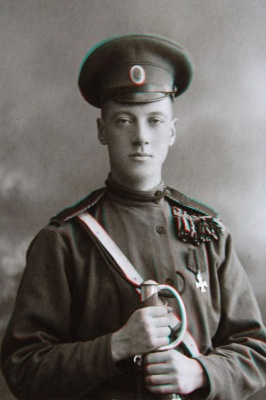In the morning the Commissariat began visiting all the units in the garrison, to obtain their consent to our transfer. The Committee had appointed a meeting of the whole garrison for 2 p.m., i.e., three hours before our departure, and in the field, moreover, immediately beside our prison.
This mass meeting did indeed take place; at it the representatives of the Commissaria and of the Committee of the Front announced the orders for our transfer to Bykhov, thoughtfully announced the hour of our departure and appealed to the garrison... to be prudent; the meeting continued for a long time and, of course, did not disperse. By 5 o'clock an excited crowd of thousands of men had surrounded the guard-room, and its dull murmur made its way into the building.
The meeting continued. Numerous speakers called for an immediate lynching... The soldier who had been wounded by Lieutenant Kletsando was shouting hysterically and demanding his head... Standing in the porch of the guard-room, Assistant Commissaries Kostitsin and Grigoriev were trying persuasion with the mob. That dear Betling, too, spoke several times, hotly and passionately. We could not hear his words.
At last, pale and agitated, Betling and Kostitsin came up to me.
"How will you decide? The crowd has promised not to touch anyone, only it demands that you should be taken to the station on foot. But we cannot answer for anything"
I replied : "Let us go"
I took off my cap and crossed myself : "Lord, bless us!"
The crowd raged. We, the seven of us, surrounded by a group of cadets, headed by Betling, who marched by my side with drawn sword, entered the narrow passage through this living human sea, which pressed on us from all sides. In front were Kostitsin and the delegates (twelve to fifteen) chosen by the garrison to escort us. Night was coming on, and in its eerie gloom, with the rays of the searchlight on the armoured car cutting through it now and then, moved the raving mob, growing and rolling on like a flaming avalanche. The air was full of a deafening roar, hysterical shouts, and mephitic curses. At times they were covered by Betling's loud, anxious voice :
" Comrades, you have given your word! . . . Comrades, you have given your word ! . . ."
The cadets, those splendid youths, crushed together on all sides, push aside with their bodies the pressing crowd, which disorders their thin ranks. Passing the pools left by yesterday's rain, the soldiers fill their hands with mud and pelt us with it. Our faces, eyes, ears, are covered with its fetid, viscid slime. Stones come flying at us. Poor, crippled General Orlov has his face severely bruised; Erdeli and I, as well, were struck — in the back and on the head.
On our way we exchanged monosyllabic remarks. I turned to Markov :
" What, my dear Professor, is this the end? "
" Apparently. . . ."
The mob would not let us come up to the station by the straight path. We were taken by a roundabout way, some three miles altogether, through the main streets of the town. The crowd is growing. The balconies of the Berdichev houses are full of curious spectators; the women wave their handkerchiefs. Gay, guttural voices come from above: "Long live freedom!"
The railway station is flooded with light. There we find a new, vast crowd of several thousand people. And all this has merged in the general sea which rages and roars. With enormous difficulty we are brought through it under a hail of curses and of glances full of hatred. The railway carriage. An officer — Eisner's son — sobbing hysterically and addressing impotent threats to the mob, and his soldier servant, lovingly soothing him, as he takes away his revolver; two women, dumb with horror — Kletsando's wife and sister, who had thought to see him off. . . . We wait for an hour, for another. The train is not allowed to leave — a prisoner's car is demanded. There were none at the station. The mob threatens to do for the Commissaries. Kostitsin is slightly buffeted. A goods car is brought, all defiled with horse-dung — what a trifle ! We enter it without the assistance of a platform; poor Orlov is lifted in with difficulty; hundreds of hands are stretched towards us through the firm and steady ranks of the cadets. ... It is already 10 p.m. The engine gives a jerk. The crowd booms out still louder. Two shots are heard. The train starts.
The noise dies away, the lights grow dimmer. Farewell Berdichev!
Kerensky had originally intended to confront the congress, that met on the 27th, with an accomplished fact, but his courage failed him, and on October 3 he submitted to its directorate the names of those whom he proposed to include in his Cabinet. See more
It soon became clear that there was no point in even thinking of returning to Petrograd. My hopes of recovering my home vanished daily. Moreover, in view of the general situation, it was better to spend the winter in Kislovodsk. So I started to look for a new house.
What happened in Yasnaya? I read the messages here and I worry. I am thinking of coming to yours in about a week. I dream of going to the south, as my autumn bronchitis has started and i feel ill, and yesterday I fell from my horse again and hurt my chest…
It's been raining the whole day. I can't work at all.
The night is dark, it's raining the whole time. I visited the mill today. The men a full of rage on the inside. Talking is pointless!
I feel my strength wilting all the same, I’ve weakened considerably. My only distraction are the visits from Doctor Meriamson, who always brings some news. See more
I never try to write out or remember the sayings of the great generals, writers and other remarkable people, but the following words of a man who was defeated at Prenzlau and later became one of the most important figures in the effort to revive his homeland and re-establish her military power have become deeply embedded in my memory: “The harder the situation, the more boldly we must go”.
My dear Lyubochka,
I haven't received your postcards in a while. Had it not been for Oksana's message, that you're in Evpatoria and everything is well, I would have been very worried. It's autumn here, I'm working a lot, despite my very sour mood. See more
The truth is that I feel like I've lost the sense of my scientific work now that my homeland is dying. Who am I working for? See more
We've heard from Washington that the US military has worked out a plan of deploying their army in Europe. According to the plan, a million people strong army has been formed for this purpose. The army will be deployed within a year. Every month 10,000 men will be sent out.

